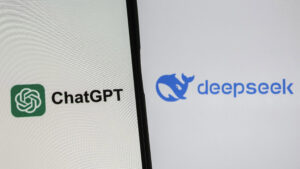DeepSeek and Manus: China’s Role as Catalysts for the UK’s Position in the AI Arms Race

The world of artificial intelligence (AI) underwent a significant transformation with the introduction of DeepSeek R1 in January 2025 and Manus, a general agent, in March of the same year. Both of these innovations became instant sensations, raising questions about the implications for the West, particularly the UK, as it navigates the AI landscape alongside rising Chinese startups.
DeepSeek: Cost-Effective Open-Source AI
DeepSeek is a company that focuses on creating open-source large language models (LLMs) in a highly cost-effective manner. Established in 2023 by Liang Wenfeng, DeepSeek has received backing from High-Flyer, a Chinese hedge fund. Its primary product, DeepSeek R1, positions itself as a peer competitor to popular models like OpenAI’s ChatGPT and Anthropic’s Claude.
What sets DeepSeek apart from its competitors is its open-source framework. While many AI companies maintain proprietary control, DeepSeek allows researchers and companies to access, modify, and build upon their models freely, making it an attractive option for those in the UK looking for affordable and advanced AI solutions.
According to Draven McConville, a UK-based AI investor, DeepSeek’s open-source initiative could empower British startups. He explains, “By providing a cost-effective model, DeepSeek enables local researchers and businesses to innovate without the heavy financial burden usually associated with high-level AI development.”
DeepSeek’s cost structure is particularly appealing. The company reports that its V3 model was trained at a lower cost and required less computing power compared to leading models like GPT-4 and Meta’s Llama 3.1. This is especially beneficial for the UK, where large-scale technological projects can take years to complete. McConville notes, “Models like R1 indicate that the traditional way of doing things might need a rethink.”
DeepSeek achieves its cost efficiency through innovative techniques, including the Mixture-of-Experts architecture, which activates only relevant sub-models for specific tasks. This method significantly reduces computational demands and works effectively on widely available hardware, making advanced AI more accessible.
Related Topics in Artificial Intelligence
Manus: The Autonomous AI Agent
Launched in March 2025 by the Chinese startup Monica, Manus is a groundbreaking autonomous AI agent that operates differently from standard chatbots. Rather than merely responding to questions, Manus can perform a variety of complex tasks without requiring constant human oversight.
Manus is built on a multi-layered architecture using Alibaba’s Qwen large language model, along with several fine-tuned models. This setup allows Manus to integrate with external tools, enabling it to browse the web, interact with applications, and extract data autonomously. This approach could significantly enhance the UK’s AI capabilities by leveraging advancements already available globally.
The features of Manus are impressive, including tasks like resume screening, stock analysis with visualizations, personalized travel planning, and streamlined website design and implementation. Although the full potential of agentic AI is still being explored, its early capabilities could provide a solution to address productivity issues in the UK workforce.
Enhancing the UK’s AI Ecosystem
The UK already occupies a notable position in the global AI scene, ranking among the top countries for AI innovation and investment. While it may not yet rival giants like the US and China, the UK has impressive success stories like DeepMind and the Alan Turing Institute to highlight its capabilities.
DeepSeek’s affordable model could help bolster the UK’s development of independent AI systems. This potential to create high-performing models at lower costs could allow British firms and research organizations to design AI solutions tailored to the country’s specific needs, ultimately reducing dependence on foreign technology.
Furthermore, the capabilities of autonomous AI agents like Manus could lead to enhanced efficiency across various sectors in the UK economy. By automating complex tasks, organizations might free employees to focus on more strategic and creative initiatives, aligning with the UK’s national AI strategy to promote an inclusive AI ecosystem.
Challenges to Overcome
While these technologies offer promising advantages, their adoption comes with challenges that must be addressed. Security and data privacy concerns are critical, especially due to DeepSeek’s origins. The UK government and organizations will need to thoroughly evaluate the potential risks, particularly for sensitive applications in public sectors.
Ethics is another important consideration. Companies must be vigilant in identifying and minimizing biases in AI training data and algorithms to ensure equitable outcomes. As AI agents like Manus gain autonomy, questions about their impact on employment and social structures arise, necessitating thoughtful discourse and policy-making.
For these innovative technologies to be successfully integrated into the UK economy, investments in AI talent development, infrastructure, and public confidence are essential. Building transparency and effectively addressing ethical issues will be vital to fostering trust and ensuring safe use of these advanced tools.





